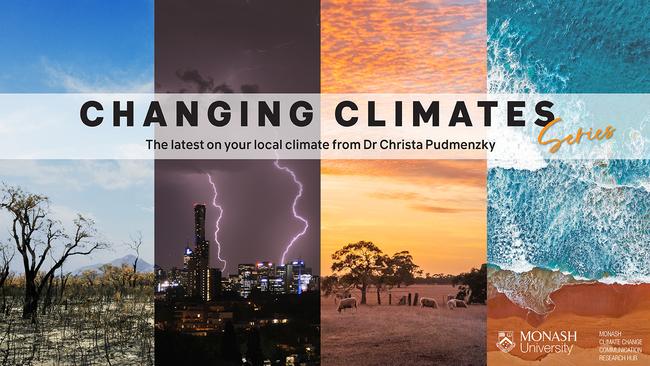Electric buses are bustling with benefits for Aussies
Host of Gladstone's Changing Climates series, Dr Christa Pudmenzky, explains how December temperatures are rising. Plus, how electric buses can pave the way to net-zero emissions.

Hyperlocal
Don't miss out on the headlines from Hyperlocal. Followed categories will be added to My News.
Australia has seen an increase in extreme weather events in recent years.
These kinds of changes can be linked to human activities, such as the burning of fossil fuels which releases greenhouse gas emissions.
Excessive emissions trap heat in the Earth's atmosphere and warm our planet.
For example, Queensland is now experiencing around three more unusually warm December nights compared to the 1970s.

We will continue to see these temperature rises along with more heatwaves and other extreme weather if we don't find a way to reduce our emissions as soon as possible.
Being one of Australia's major sources of emissions, the transport industry offers many opportunities to reduce our carbon footprint.
With people of all ages and backgrounds now seeking ways to travel that don't cost the earth, electric buses may be the answer.
Like electric cars, e-buses store their energy in a rechargeable battery on-board that eliminates the need for diesel and petrol.
Deputy Director of the Mobility Design Lab at Monash University, Robbie Napper, explains how electric bus technology is essential for reducing Australia's transport emissions.
"While buses provide a really efficient part of our transport system as far as the space they take up on the road and how many people they can move around, there's still room to improve," Dr Napper said.
"The main benefit in switching fuels from diesel or petrol to electric is the opportunity to make bus transport carbon neutral."
In fact, e-buses emit five times less carbon than their diesel counterparts, and are even three times less carbon intensive than hybrid buses.
This is mainly because electric vehicles don't produce any exhaust fumes – their only emissions come from the manufacturing and charging processes.
Bustling with benefits:
E-buses can also alleviate health risks by cleaning up pollution.
"From a global perspective, it's good to switch the energy source to renewables, but there are also local benefits," he said.
"We'll have better air quality because we're not burning the fuel right outside people's houses and schools."
For example, e-buses reduce harmful exhaust fumes that cause respiratory disease, cancer, and ultimately, more than 1700 deaths per year in Australia.
Transitioning to greener transport means that Australia could save almost $500 billion in associated health costs by 2035.
Studies from countries with tried and tested electric bus fleets show that these green machines bring mental health benefits too.
Since Sweden made the switch to electric in 2019, residents living along bus routes have reported less exhaustion and low moods as a likely result of noise reduction.
Dr Napper said e-buses' quieter engines can even improve the ride quality for passengers on-board.
Additionally, e-buses offer a lot of potential for businesses as they can create opportunities for energy providers and battery suppliers.
As these vehicles get the green-light, the electric bus transition will create 140,000 new jobs over the coming years.

A greener future:
Australia's state governments are implementing policies and investing large sums to make sure these carbon-cutting coaches hit the streets.
Dr Napper outlined that these commitments are a "major step toward electrifying and transitioning bus fleets to renewables".
Queensland has announced that all new public buses will be electric from 2025 onwards, while its first emissions-free bus depot will be operational in the coming months.
Australians are in favour of even greater action nationwide – the Australia Institute found
74 per cent of Aussies support electrifying all state bus fleets by 2030.
By taking public transport instead of your car, you can highlight e-buses as a high-priority transport option and help support the transition.
Alternatively, you can invest in projects that focus on grid upgrades to bring the electric vehicle charging revolution a step closer to reality.
Want more information on how your climate is changing? Check out the last article in this series.
Dr Christa Pudmenzky is a climate scientist at the University of Southern Queensland.
This column is part of a collaboration between Monash University and News Corp to deliver hyperlocal weather and climate information.

